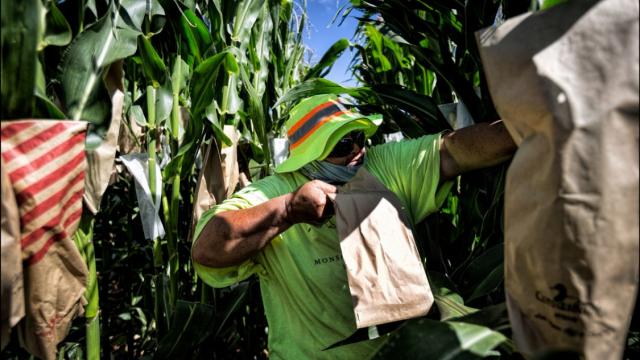
A Maui County ballot initiative to temporarily ban genetically engineered crops narrowly passed last week following one of the most heavily financed political campaigns in state history.
The controversial measure pulled ahead late Tuesday, passing 50 percent to 48 percent — a difference of just 1,077 votes. It was a stunning turnaround after the measure was initially losing by 19 percent when the first results rolled in.
The county’s first-ever ballot initiative targeting global agriculture companies Monsanto and Dow AgroSciences attracted nearly $8 million from opponents, making it the most expensive campaign in Hawaii’s history.
Opponents outspent advocates more than 87 to 1, according to the latest campaign spending reports available Tuesday. That amounts to more than $300 for every “no” vote.
But it still wasn’t enough to beat scores of Maui County residents who spent weeks canvassing, sign-waving and calling friends to share their concerns about seed companies’ farming practices.
Ashley Lukens, who directs the Hawaii chapter of the Center for Food Safety, a national nonprofit that has been lobbying for more regulation of genetically modified organisms (GMOs), said Maui County residents deserve all the credit for the turnaround.
“I think that this is a really strong message to the entire agrochemical industry in the state of Hawaii that we are no longer going to sit idly by and watch them expand their operations without the kinds of regulations that ensure the health and safety of people across Hawaii,” Lukens said.
Tom Blackburn-Rodriguez, spokesman for the political action committee Citizens Against the Maui County Ballot Initiative, thanked supporters for their help in an emailed statement.
“We are deeply concerned for the 600-plus workers and their families, local businesses, farmers and taxpayers that will be negatively impacted by the passage of this scientifically unjustified, deeply flawed and irresponsible proposal,” he wrote.
The bill’s success defies what happened to highly controversial GMO labeling ballot initiatives in California and Washington, which failed in 2012 and 2013 respectively. As in Maui, Monsanto and Dow AgroSciences were among the top five contributors to defeat both bills.
Colorado voters also rejected a bill to impose GMO labeling on Tuesday and a similar Oregon measure was trailing according to preliminary results. Vermont is the only state that has successfully passed legislation to require labels on food containing GMO ingredients, and the law is currently being litigated.
The Maui County measure is significantly more far-reaching, seeking to impose a temporary moratorium on genetically engineered crops until the county analyzes their impact on the county’s public health and environment.
That would bring to a standstill the majority of the farming being done by Monsanto and Dow AgroSciences, both of which operate in Maui County.
Monsanto owns or leases 3,100 acres on Maui and Molokai, and employs about 540 people, including part-time or seasonal workers. Dow AgroSciences’ affiliate Mycogen Seeds farms about 400 acres on Molokai and employs around 100 people.
Citizens Against the Maui County Farming Ban has paid for more than $1.3 million worth of TV ads statewide warning voters that the measure would cause the loss of hundreds of jobs and devastate the county’s economy.
While billed as a citizens’ group, the organization is funded exclusively by Monsanto, Dow AgroSciences, a national biotech organization and a political action committee affiliated with Hawaii’s biotech trade group.
Maui County ballot measure is part of a growing movement against genetically engineered organisms (GMOs) across Hawaii that’s resulted in more stringent regulations on the biotech industry on Kauai and the Big Island.
Hawaii is a key location for the seed industry because the state’s weather allows for year-long farming. But residents have become increasingly concerned about how GMO farming and its associated pesticide use may be impacting both health and the environment.
As the election results were announced on Tuesday, advocates for Maui County’s ballot initiative gathered in the courtyard in front of Akaku TV Station to watch the election results roll in.
Despite raising only about 1.1 percent of what the bill’s opponents raised, members of the SHAKA Movement, the group behind the ballot initiative, still sought to drum up support over the weekend.
On Saturday, the group hosted a day-long Hawaiian music festival called “Aloha da Vote.” On Sunday, the organization held a party called “Shake It For Shaka” that advertised “tribal ethno global beats to move feets & stir us into ecstatic bliss dance heaven.”
But an email to supporters inviting them to Election-Day festivities suggested some the SHAKA Movement’s leaders may be less than optimistic about their chances: “No matter what happens with the initiative, we have been a success in shedding the light on the GMO issue,” the message said.
Meanwhile, on Tuesday night, biotech supporters gathered just 2 miles away from the SHAKA Movement at Maui Beach Hotel.
On Monday, Blackburn-Rodriguez said that Citizens Against the Maui County Farming Ban was carrying out “traditional campaign activities” in advance of Election Day but declined to specify what that entails.
“I’m not comfortable describing our campaign activities,” he said. He later sent an email emphasizing that the organization expected to win.
3 WAYS TO SHOW YOUR SUPPORT
- Log in to post comments











